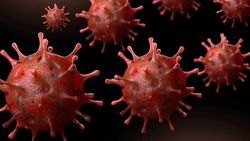What the first scientific study says
“The spread of Covid-19 is linked to 5G mobile networks.” “Place a halved onion in the corner of your room to catch the Covid-19 germs.” “Sunny weather protects you from Covid-19.”
These fake news stories and others like them spread rapidly on social media during the early stages of the pandemic. The wave of misinformation was so great that the authorities coined a word for it: “Infodemic.”
Fake news isn’t new. But interest in it has increased sharply in recent years, corresponding with the rise of social media. Attention spiked in 2016, amid concerns that the Brexit referendum and the US presidential election may have been influenced by misinformation spread by other countries.
It’s assumed that fake news has a negative effect on people’s behaviour. For example, it has been claimed that fake news might affect people’s willingness to wear a mask, get a vaccine, or comply with other public health guidelines. Yet, surprisingly, virtually no research has directly tested this assumption, so my colleagues and I took on the challenge of measuring what effect fake news actually has on people’s behaviour.

























 News
News